Press release shared below
“BSL translation of the Ofsted report is available here
Ofsted describes Deaf Academy as a ‘place of inspiration’ in new report

The Deaf Academy has been described as a ‘place of inspiration’ in its latest Ofsted report – which has seen it attain the highest rating in its history with the achievement of a good grade with outstanding features.
The inspection, which took place in February, graded the behaviour and attitude, personal development of students as outstanding and the overall effectiveness of the Academy, the quality of education, leadership and management and sixth form provision as good.
The new Ofsted rating shows huge progression for the Academy, which had previously been rated as requiring improvement.
In the report, Lead Inspector Leanne Thirlby, and His Majesty’s Inspector, and Ofsted Inspector Paula Marsh, said: “The Deaf Academy is a place of inspiration for the pupils who attend. Pupils have often had negative experiences of education and engagement in the world around them prior to attending. One pupil described the school as ‘paradise’. Others agree, saying they are in a place where they can communicate, feel heard and visible. Pupils value the incredibly strong relationships with adults.
“Leaders prioritise pupils’ social, emotional and mental health needs. Adults are aspirational role models, whether they are hearing or deaf members of staff. They encourage pupils towards independence and active participation in society. Staff are well-informed about what successful inclusion should be for a deaf young person. Pupils are fully accepting of the diverse needs of their peers. They are encouraged to extend this to diversity and cultural awareness in a much wider sense.”
The report goes on to state that everyone at the Academy has high expectations of behaviour to which pupils respond exceptionally well. Pupils are highly respectful of the support that staff put in place when they experience challenge. Pupils trust adults and feel safe. There is a culture of openness and sharing around concerns and worries. Pupils do not have any concerns about bullying.
Tony Alexander, Chair of Governors at the Deaf Academy, said: “This is an exceptional grading from Ofsted, of which we are very proud indeed. The achievement is a result of consistent hard work from every single member of staff at the Academy.”
Sylvan Dewing, Principal of the Deaf Academy, said: “We are delighted to achieve this grading from Ofsted. I’d like to thank every member of staff who has contributed to this achievement. Thanks also to our wonderful students, parents, carers and partners. It is a privilege to be part of the education of such remarkable young people who continue to make us proud every day.”
The report continues:
- Leaders and staff are highly ambitious for all pupils and that leaders have made significant changes that have had a positive impact. These include a leadership re-structure and appointments to the staff that have increased the balance of expertise and knowledge to meet the special educational needs and/or disabilities (SEND) that pupils have. This also supports the progression towards a bespoke and aspirational curriculum. This curriculum development is building on the improvement work that has been ongoing over recent years.
- The use of curriculum pathways and a focus on British sign language (BSL) and deaf studies means pupils are in a place where they can learn with much greater success. This work is not yet fully established as a coherent and well-sequenced curriculum across all subject areas. However, where leaders have focused their work, there is clear impact on how well pupils learn.
- BSL and deaf studies is the fundamental part of all pupils’ learning. It enables them to fully access the rest of their education. It is through BSL and deaf studies that pupils learn to communicate and become aware of themselves as learners and deaf individuals. Through a multi-layered approach by skilled members of staff, pupils learn English as an additional language to BSL. The development of visual phonics by hand gives pupils the skills they to read and write in English. This enables them to learn in other subjects because they can read, comprehend and record their learning in English, as well as use BSL.
- Pupils who need a focus on early communication get the precise support they need. Leaders use education, health and care (EHC) plans to inform individualised targets towards ambitious outcomes. Joint working with the therapy team ensures that learning and achievements beyond the academic are well provided for. Leaders check this work to ensure it is of high-quality and meets the needs of the pupil. Leaders are proactive in their work to strengthen the provision for all pupils. They make effective use of the information contained in EHC plans to inform future development and training needs. As a result, staff are enhancing their knowledge and expertise to meet the increasingly complex needs of the pupils in the school and college.
- Leaders have designed areas in school to support a total communication way of learning and interacting. Pupils make use of these areas to enjoy books, socialise and support themselves and each other to stay regulated. This epitomises the nurture, tolerance and respect that pupils, some of whom can demonstrate some high-risk behaviour, have for each other and the staff.
- Many of the students in the college start at post 16. They follow one of three pathways to support their preparation for adulthood. Leaders build flexibility into the pathways. This makes sure that there is ambition for students’ outcomes as they prepare for their next steps. Students take part in work experience and employer encounters with a network of accessible employers established by leaders.
- The governors and trustees share the ambition of school leaders. They know the strengths of the school and where aspects need to develop further. Staff feel very well supported. They say that leaders are respectful of workload in this period of change. Staff describe a shared commitment and determination in helping pupils achieve the best possible outcomes.
Safeguarding measures at the Academy were also deemed effective, with the report stating that all staff know and understand the procedures for keeping pupils safe, and systems for recording and reporting concerns are robust. Pupils also learn about keeping themselves safe and being risk aware. Leaders prioritise aspects of this to address the increased vulnerabilities such as relationship education and behaviour when online.
The Deaf Academy, which is a charity, moved to Exmouth in 2020. Since that time student numbers have increased significantly, creating a need for additional residential space. To meet this need, the organisation has bought a nearby property – the former convent in Long Causeway, Exmouth – which it will refurbish to create a 10-bed residential and learning space for students aged between 19 and 25.
The Academy is aiming to open the new centre, which will be the only one of its kind in the UK, in September. A JustGiving page has been set-up to allow parents, the community and friends of the Academy to support the project.
For more information visit www.thedeafacademy.ac.uk



